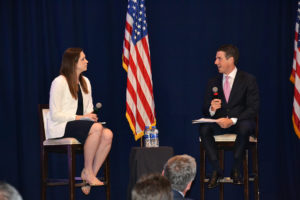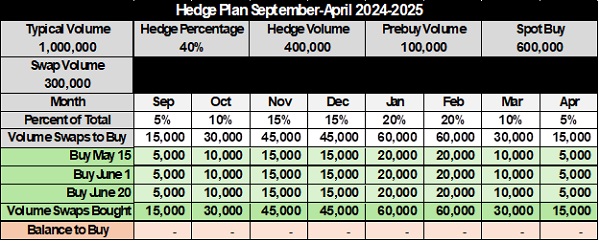Propane can’t afford to sit idle during government gridlock
Lobbying congressional leaders on propane’s advantages is a valuable exercise for industry members. It’s become even more important in today’s competitive energy environment where defending one’s ground, let alone surging ahead, is a constant fight.

Madeline Vey of Rep. Bob Latta’s office and NPGA’s Tyler Lawrence role-play congressional meeting scenarios for Propane Days attendees. Photo by Brian Richesson
When the industry descended on the nation’s capital last month for Propane Days, it faced a major challenge: 100 new members in Congress, who were installed after last November’s mid-term elections. Seemingly, we hit the restart button on the process of educating the nation’s leaders about everything propane can do.
“It’s a huge loss of institutional knowledge – for propane, for the process, everything,” says Michael Baker, director of legislative affairs for the National Propane Gas Association (NPGA), who, with other NPGA leaders, is tasked with preparing the industry so it can effectively communicate propane’s position to key influencers.
The federal government – with a Democratic-led House and a Republican-controlled Senate – is gridlocked. Of the 17 bills passed into law this year, five were simply to keep the government in operation, according to NPGA leaders in June. Meanwhile, the states have introduced more than 20,000 bills nationwide. With little action from Congress, the states are saying: We’ll do it ourselves.
Clearly, the federal legislative process takes time, but NPGA leaders see an opportunity now to educate and build relationships with congressional leaders. This can be done successfully with help from a unified, engaged industry.
“This logjam is going to clear,” Baker said on the first day of Propane Days. “Days like today are going to help those legislators know that when it’s time to legislate again, propane isn’t left in the dark.”
Five points about your congressional meetings
There’s a method to meeting with elected officials. NPGA prepares attendees via webinars, issue briefs, key facts and figures, and in-person explanation prior to the meetings.
This year, Madeline Vey of Rep. Bob Latta’s office (R-Ohio) offered some advice for industry members prior to their meetings on Capitol Hill as she role-played meeting scenarios with NPGA’s Tyler Lawrence. Here are five things you should know about meeting with your congressional leaders.
⦁ While it’s important to have an “ask,” understand the congressional member or staffer might not be able to commit right away. “What you should want is for them to do their due diligence, and you want them to go back and look at it. Don’t be discouraged if you don’t get an answer,” she says.
⦁ Be yourself and help them recall who you are. “The more you can personalize it, the better it goes.”
⦁ Meeting with a staffer – instead of the congressional leader – doesn’t mean the meeting is any less important. “Just because you’re meeting with somebody young, it doesn’t mean they’re not going to give the congressman the right information,” Vey says.
⦁ Meeting outside the office, even in a hallway, doesn’t mean the meeting is any less important, Lawrence notes.
⦁ Expect the unexpected. “We all expect, because our time is important, that we’re going to show up and things are going to go as planned,” Baker says. “There is no plan. Being patient, flexible and accommodating is really important.”
















